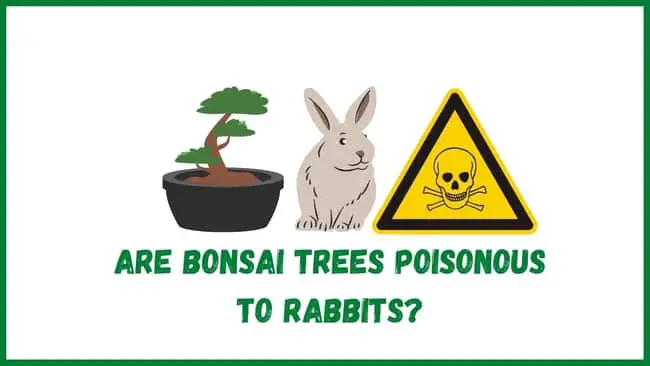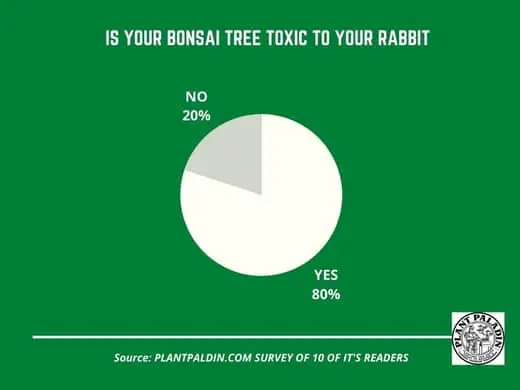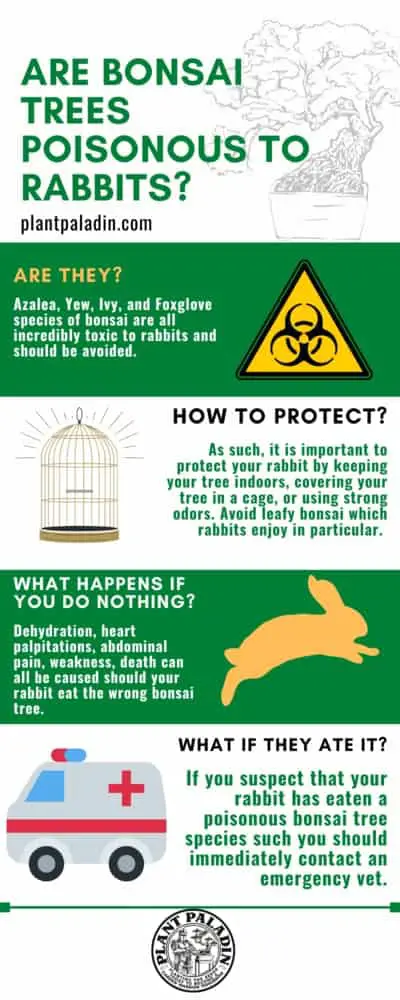This website is supported by its readers. If you click one of my links I may earn a commission. I am also a participant in the Amazon affiliates program and I will also earn a commission from qualified purchases.

In the USA alone there are 6 million households that keep rabbits as pets. Pair this up with the fact that keeping bonsai trees is more popular than ever and, naturally, there is going to be some crossover between the two. An important question that needs to be asked is are bonsai trees poisonous to rabbits?
Azalea, Ivy, Yew, and Foxglove species of bonsai are all poisonous to rabbits. The bark of Cedar and Pine can also be toxic to rabbits. Seeds of fruiting bonsai such as Cherry or Plum contain cyanide which is also dangerously poisonous to rabbits and can prove fatal.
So what should you do if your rabbits eat a poisonous bonsai? And how can you prevent your rabbit from eating bonsai altogether? Keep reading to find out more!
Just a quick heads up, over the past three years of running Plantpaladin, hundreds of people have asked for product recommendations. As such, You can find my favorite indoor bonsai tree here (link takes you to Bonsaiboy), my favorite outdoor bonsai tree (link takes you to Bonsaiboy), or have a look at all the products I recommend here.
Are bonsai trees poisonous to rabbits?
A lot of bonsai trees out there are toxic to common household pets such as cats, dogs, and, of course, rabbits.
With one of my nephews recently buying a pet rabbit (and coming over to my house fairly often!) a question I wanted to find out was are bonsai trees poisonous to rabbits?
As such, I got in touch with my local vets, visited a few botanical gardens (both in Oxford and Birmingham), and did a quick survey of 10 plant paladin readers who also own rabbits.
Here is what I found:
- Some bonsai species are poisonous to rabbits.
- This includes species such as Azaleas, Ivy, Yew, and Foxglove – all of which are commonly used in bonsai.
- All parts of those species are toxic to rabbits.
- The severity of the toxicity will vary from species to species with Azalea being the most dangerous – being fatal to rabbits if ingested.
- Other bonsai species such as Cedar Wood, Olive, or Pines trees such as Scots Pine have bark which can be toxic to rabbits.
- This bark then needs to be treated before a rabbit uses it to train their teeth
- The seeds and pips from fruiting bonsai will also be toxic as they contain small doses of cyanide – this includes species such as cherry, plum, apple, and orange.
- Some coniferous bonsai species such as Juniper which have needle/tip-like leaves can also be hazardous to rabbits, getting stuck in their threats causing rabbits to choke.
- Most bonsai tree species such as Chinese Elm, Jade, Ficus have some mild toxicity and are commonly eaten by rabbits – they can cause some gastrointestinal discomfort.
What bonsai species are poisonous to rabbits?
Azalea, Yew, Ivy, and Foxglove species of bonsai are all incredibly toxic to rabbits and should be avoided. The bark from Cedar, and Pine bonsai is also toxic to rabbits. The seeds of fruiting bonsai such as Plumb and Apple bonsai are also toxic to rabbits.
Keep in mind that bonsai trees are usually poisonous to rabbits in 3 main ways:
- Being fatal.
- Causing general severe illness.
- Gastrointestinal discomfort or a mild reaction.
Whilst almost all bonsai species can cause gastrointestinal discomfort such as diarrhea or vomiting if ingested, it’s most important that you keep your rabbit away from bonsai species that can prove fatal.
Now bonsai trees are not one single type of plant but thousands of different species that make up the hobby.
As such, I’ve put together a table below that goes into detail on the toxicity levels of different bonsai species that are the most common.
Bonsai Species | Severity | What part of the bonsai | Side effects |
Azalea | Severe | All Parts | Dizziness, heart palpitation, death. |
Foxglove | Severe | All Parts | Dehydration, heart palpitations, abdominal pain, weakness, death |
Yew | Severe | All Parts | Dehydration, heart palpitations, abdominal pain, weakness, death |
Ivy | Moderate to severe | Leaves and berries | Lethargy, loss of weight, fitting |
Cedarwood | Severe | Bark | Liver complications |
Pine | Severe | Bark | Liver complications |
Juniper | Mild | Leaves | Rabbits can choke on the tips like leaves |
Cherry | Moderate | Seeds/Pips | Seeds/pips can be toxic so need to be removed before the rabbit is fed the fruit |
Lime | Moderate | Seeds/Pips | Seeds/pips can be toxic so need to be removed before the rabbit is fed the fruit |
Lemon | Moderate | Seeds/Pips | Seeds/pips can be toxic so need to be removed before the rabbit is fed the fruit |
Orange | Moderate | Seeds/Pips | Seeds/pips can be toxic so need to be removed before the rabbit is fed the fruit |
Apple | Moderate | Seeds/Pips | Seeds/pips can be toxic so need to be removed before the rabbit is fed the fruit |
Crabapple | Moderate | Seeds/Pips | Seeds/pips can be toxic so need to be removed before the rabbit is fed the fruit |
Chinese elm | Mild | Leaves and bark | Eating too much of the leaves and bark will cause gastrointestinal discomfort for rabbits. |
Ficus | Mild | Leaves and bark | Eating too much of the leaves and bark will cause gastrointestinal discomfort for rabbits. |
Jade | Mild | Leaves and bark | Eating too much of the leaves and bark will cause gastrointestinal discomfort for rabbits. |
Why are bonsai trees poisonous to rabbits?
Poisonous bonsai tree species such as Azaleas or Foxglove contain Cardiac Glycosides, Grayanotoxins, and other naturally occurring chemicals in plants that have adverse side effects in rabbits.
These chemicals can cause rabbits to vomit, get diarrhea, get tremors, or in severe cases go into cardiac arrest.
Chemicals like these and many others are found in all parts of toxic bonsai tree species such as the leaves, bark, flowers, and fruit.
This toxicity can also be found in the top potting soil.
Other fruiting bonsai such as plumb or cherry bonsai have seeds/pips that contain small amounts of cyanide.
These seeds and pips can be fatal to rabbits due to their small size.
What to do if your rabbit eats poisonous bonsai?
If you suspect that your rabbit has eaten a poisonous bonsai tree species such as Azalea or Foxglove you should immediately contact an emergency vet. Azaleas and Sago Palms can be fatal in a very short time.
The sooner you get a professional involved the higher chance of survival your rabbit will have.
A few useful numbers for you to contact can be found below:
- ASPCA Animal Poison Control – 1-888-426-4435
- Pet Poison Helpline – 1-855-764-7661
If your rabbit has eaten a bonsai species that are moderately or mildly toxic, I would still not wait this out and contact your vet as soon as possible as other complications can arise from your rabbit ingesting poisonous bonsai.
For example, the toxins of a mild bonsai could cause your rabbit to throw up, but your rabbit could choke on its vomit making the problem significantly more severe.
How to stop rabbits from eating bonsai
If you are worried that your rabbits are going to eat your bonsai there are a few methods you can follow to prevent this.
I go into more detail on this on my post here – but to summarise quickly:
- Move your bonsai indoors – Moving your bonsai tree indoors, in a cold frame, or away from where your rabbits reside will be the easiest way to prevent your rabbit from eating your tree – just ensure it gets enough sunlight indoors.
- Keep your bonsai in a cage – Creating a protective barrier will prevent your rabbit from touching any toxic part of the tree.
- Use scares – Rabbits can be easily trained, the sound of predators can scare them from going near your trees.
- Invest in strong odors – Rabbits have a strong sense of smell. Vinegar and ammonium rags can be placed near your bonsai and rabbits will not go near.
Study on if bonsai trees are poisonous to rabbits
Finally, I wanted to finish off by seeing how many plant paladin readers own bonsai trees that are toxic to the rabbits they own.
Here were the results:

It’s important to note that rabbits are not the only animal that finds some bonsai species toxic. As such, I recommend having a look at the following posts:
My top picks for the gear you will need!
So like I mentioned earlier, over the past three years of running PlantPaladin, hundreds of people have asked me for my recommendations on the best bonsai gear on the market.
Having spent thousands of dollars on bonsai items these past few years and tested at least 100 bonsai-specific products, I’ve listed my favorite products below – All of which I highly recommend and think you can get great value.
They can purchase directly by clicking the link to take them to Amazon.
Bonsai Tool Set: One of the significant challenges I’ve had is finding a toolset that was not only durable but didn’t break the bank. SOLIGT has recently developed a fantastic bonsai tool set that covers all the tools you need to trim, prune, and repot your trees. – You can grab it here.
Complete Bonsai Set: Many of you will want to grow your bonsai trees entirely from scratch, but finding the varicose seeds, pots, and other items in one place can be challenging. Leaves and Sole then have created a complete bonsai set that I’ve personally used that ticks all the boxes. You can grab it here.
Bonsai wire: The number of times I’ve run out of wire for my bonsai or purchased cheap bonsai wire that doesn’t do the job is embarrassing for me to admit. After a lot of trial and error, I found that using Hotop’s aluminum bonsai wire is one of the best options on the market. This can easily be used for both indoor and outdoor bonsai. You can grab it here.
This post was written by Fehed Nicass who has been passionate about bonsai for over 3 years.

